| |||||||||
| Decades: | |||||||||
|---|---|---|---|---|---|---|---|---|---|
| See also: | |||||||||
The following lists events that happened during 1822 in South Africa .
| |||||||||
| Decades: | |||||||||
|---|---|---|---|---|---|---|---|---|---|
| See also: | |||||||||
The following lists events that happened during 1822 in South Africa .
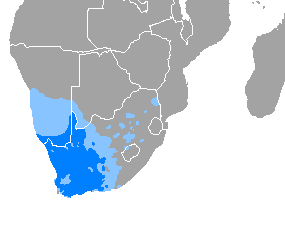
Afrikaans is a West Germanic language that evolved in the Dutch Cape Colony from the Dutch vernacular of Holland proper used by Dutch, French, and German settlers and people enslaved by them. Afrikaans gradually began to develop distinguishing characteristics during the course of the 18th century. Now spoken in South Africa, Namibia and Botswana, Zambia, and Zimbabwe, estimates c. 2010 of the total number of Afrikaans speakers range between 15 and 23 million. Most linguists consider Afrikaans to be a partly creole language.
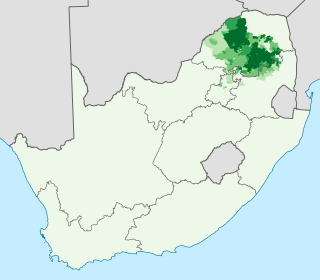
Northern Sotho, or Sesotho sa Leboa as an endonym, is a Sotho-Tswana language spoken in the northeastern provinces of South Africa. It is sometimes referred to as Sepedi or Pedi, its main dialect, through synecdoche.

The Semitic languages are a branch of the Afroasiatic language family. They are spoken by more than 330 million people across much of West Asia, the Horn of Africa, and latterly North Africa, Malta, West Africa, Chad, and in large immigrant and expatriate communities in North America, Europe, and Australasia. The terminology was first used in the 1780s by members of the Göttingen school of history, who derived the name from Shem, one of the three sons of Noah in the Book of Genesis.

South African English is the set of English language dialects native to South Africans.

Tswana, also known by its native name Setswana, and previously spelled Sechuana in English, is a Bantu language spoken in Southern Africa by about 8.2 million people. It belongs to the Bantu language family within the Sotho-Tswana branch of Zone S (S.30), and is closely related to the Northern Sotho and Southern Sotho languages, as well as the Kgalagadi language and the Lozi language.
Spoken English shows great variation across regions where it is the predominant language. For example, the United Kingdom has the largest variation of accents of any country in the world, and therefore no single "British accent" exists. This article provides an overview of the numerous identifiable variations in pronunciation; such distinctions usually derive from the phonetic inventory of local dialects, as well as from broader differences in the Standard English of different primary-speaking populations.
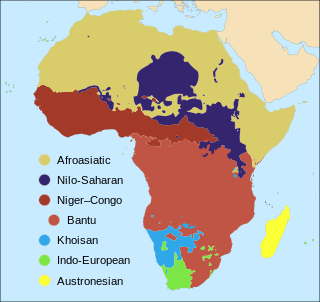
The total number of languages natively spoken in Africa is variously estimated at between 1,250 and 2,100, and by some counts at over 3,000. Nigeria alone has over 500 languages, one of the greatest concentrations of linguistic diversity in the world. The Languages of Africa belong to many distinct language families, among which the largest are:

Zulu, or isiZulu as an endonym, is a Southern Bantu language of the Nguni branch spoken in Southern Africa. It is the language of the Zulu people, with about 12 million native speakers, who primarily inhabit the province of KwaZulu-Natal of South Africa. Zulu is the most widely spoken home language in South Africa, and it is understood by over 50% of its population. It became one of South Africa's 11 official languages in 1994.
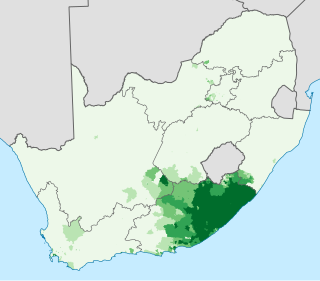
Xhosa, formerly spelled Xosa and also known by its local name isiXhosa, is a Nguni language and one of the official languages of South Africa and Zimbabwe. Xhosa is spoken as a first language by approximately 10 million people and as a second language by another 11 million, mostly in South Africa, particularly in Eastern Cape, Western Cape, Northern Cape and Gauteng, and also in parts of Zimbabwe and Lesotho. It has perhaps the heaviest functional load of click consonants in a Bantu language, with one count finding that 10% of basic vocabulary items contained a click.

Swazi or siSwati is a Bantu language of the Nguni group spoken in Eswatini and South Africa by the Swati people. The number of speakers is estimated to be in the region of 2.4 million. The language is taught in Eswatini and some South African schools in Mpumalanga, particularly former KaNgwane areas. Siswati is an official language of Eswatini, and is also one of the eleven official languages of South Africa.

Venḓa or Tshivenḓa is a Bantu language and an official language of South Africa and Zimbabwe. It is mainly spoken by the Venda people or Vhavenḓa in the northern part of South Africa's Limpopo province, as well as by some Lemba people in South Africa. Tshivenda language is related to Northern Sotho which is spoken in Southern Africa. During the apartheid era of South Africa, the bantustan of Venda was set up to cover the Venda speakers of South Africa.
African-American Vernacular English (AAVE) is the variety of English natively spoken, particularly in urban communities, by most working- and middle-class African Americans and some Black Canadians.
Elandspark is a suburb of Johannesburg, South Africa. It is located in Region 9.
Atholl Gardens is a suburb of Johannesburg, South Africa. It is located in Region E.

Radio Sonder Grense (RSG), i.e. Radio Without Borders, is an Afrikaans-language radio service run by the South African Broadcasting Corporation for the whole of South Africa. Since Afrikaans is one of South Africa's 11 official languages, the SABC is required to carry an Afrikaans-language service on both radio and television. RSG is the radio part of this Afrikaans-language service. RSG broadcasts mostly on FM utilizing transmitters owned and operated by Sentech, the former signal distribution division of the SABC.
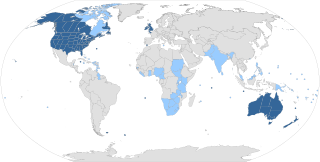
English is a West Germanic language in the Indo-European language family, with its earliest forms spoken by the inhabitants of early medieval England. It is named after the Angles, one of the ancient Germanic peoples that migrated to the island of Great Britain. Existing on a dialect continuum with Scots and then most closely related to the Low Saxon and Frisian languages, Modern English is genealogically Germanic. Although its grammar and core vocabulary are mostly West Germanic, it has borrowed many words from French and Latin, as well as some grammar and core vocabulary from Old Norse. Speakers of English are called Anglophones.

South Africa, officially the Republic of South Africa, is the southernmost country in Africa. It is bounded to the south by 2,798 kilometres (1,739 mi) of coastline that stretches along the South Atlantic and Indian Oceans; to the north by the neighbouring countries of Namibia, Botswana, and Zimbabwe; and to the east and northeast by Mozambique and Eswatini. It also completely enclaves the country Lesotho. It is the southernmost country on the mainland of the Old World, and the second-most populous country located entirely south of the equator, after Tanzania. South Africa is a biodiversity hotspot, with unique biomes, plant and animal life. With over 60 million people, the country is the world's 24th-most populous nation and covers an area of 1,221,037 square kilometres. Pretoria is the administrative capital, while Cape Town, as the seat of Parliament, is the legislative capital. Bloemfontein has traditionally been regarded as the judicial capital. The largest city, and site of highest court is Johannesburg.
Lala is a Bantu language of South Africa, claimed to be extinct in some sources. As of 1999, however, there were still a number of communities of speakers in the coastal regions of the KwaZulu-Natal province of South Africa. Although it is a Tekela Nguni language, for sociological reasons it is often considered a dialect of Zulu, whereas it differs quite markedly in phonology and to a degree in morphology, and with a large portion of its lexicon derived from Xhosa and the IsiZansi Tekela variety of the lower South Coast.
Hlubi is a minor Bantu language of South Africa, traditionally considered a dialect of Swazi. It is spoken in South Africa, near where the Xhosa, Sotho, and Phuthi languages meet at the Orange River and the southern point of Lesotho. The scattered Hlubi people speak several languages, including Swazi, and the Hlubi dialect of Xhosa in the former Bantustan of Ciskei.
Sumayela Ndebele, Northern Transvaal Ndebele or siNdebele is a Bantu language of South Africa. It is spoken northeast of Southern Ndebele.
See Years in South Africa for list of references